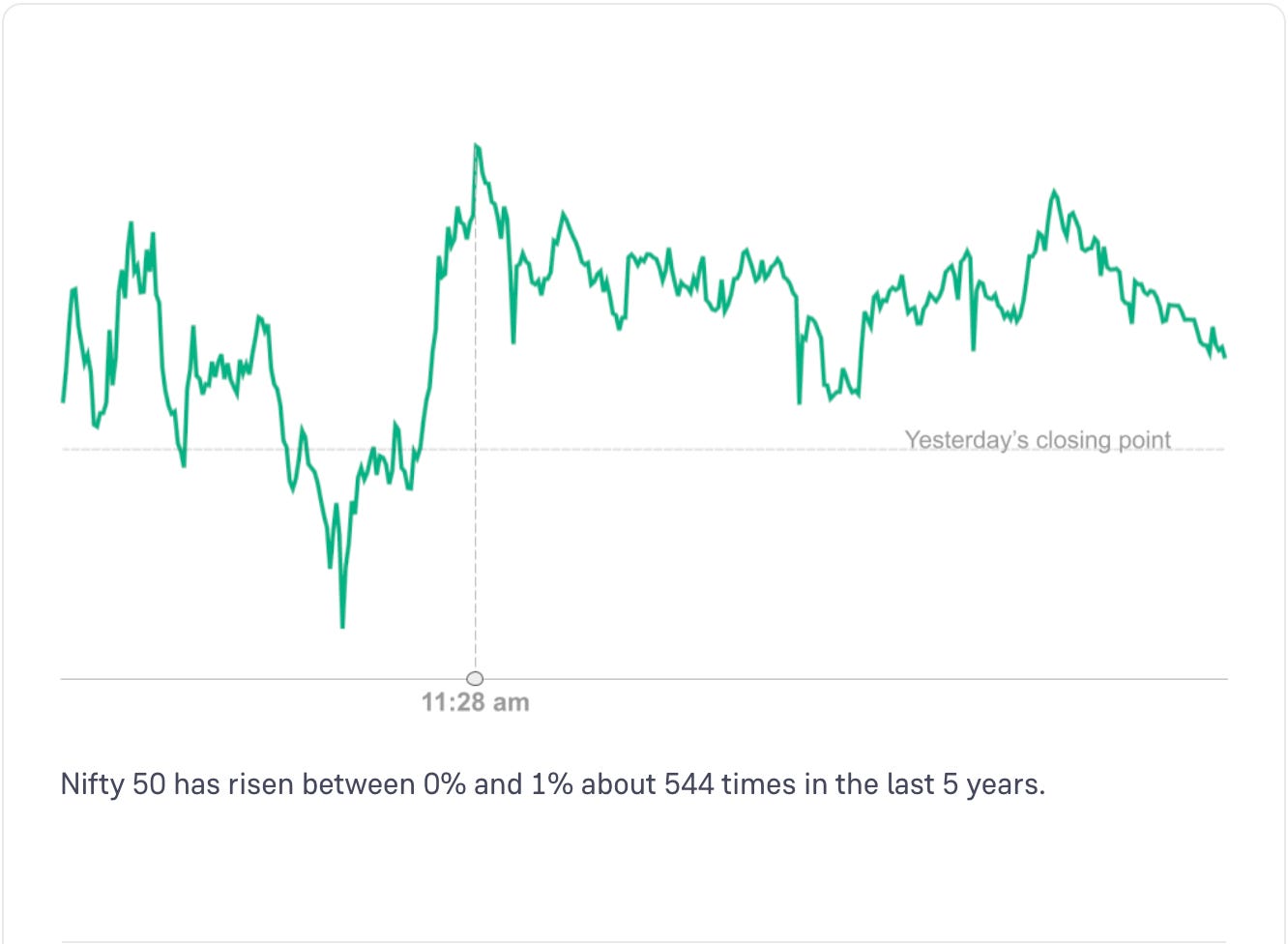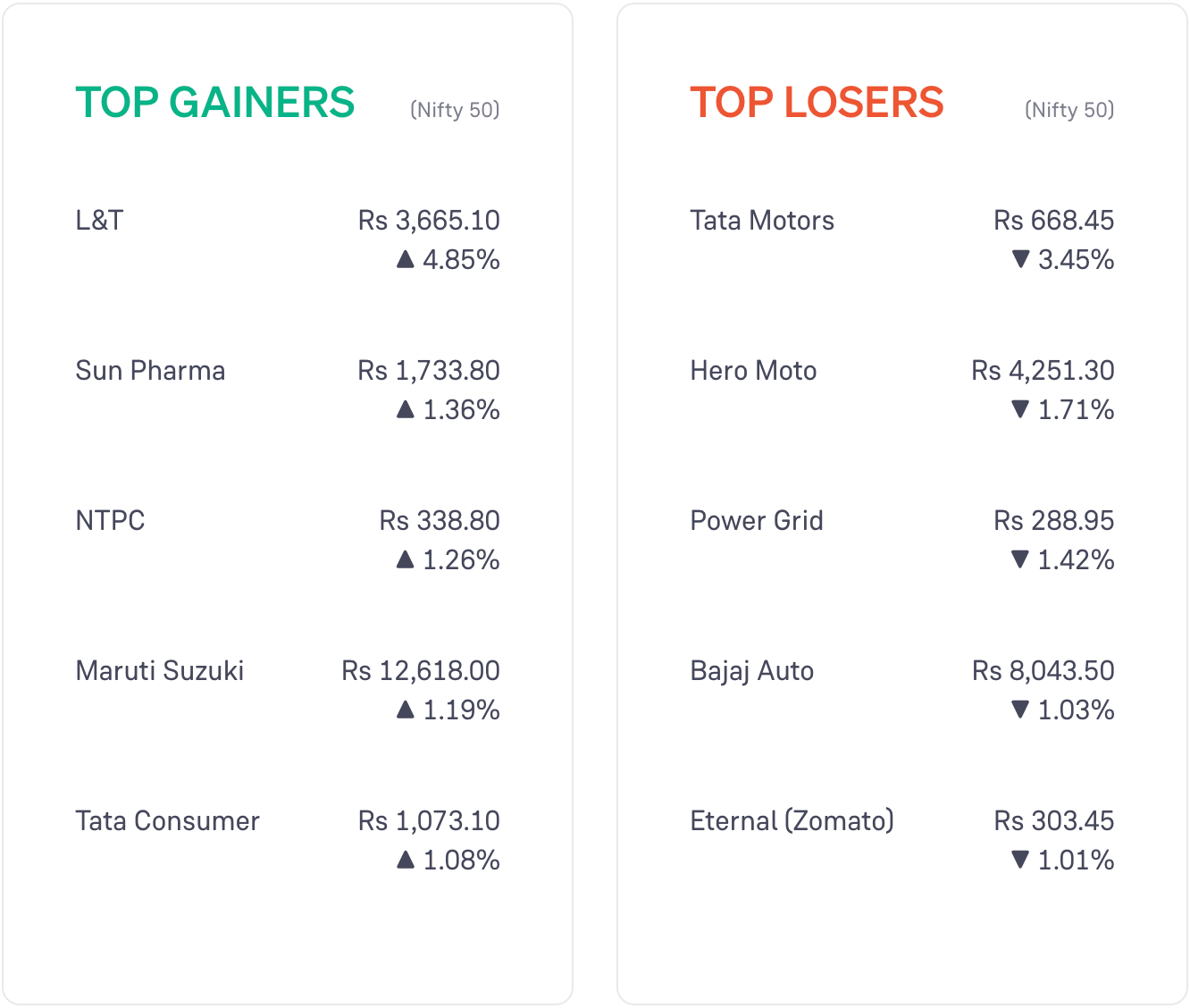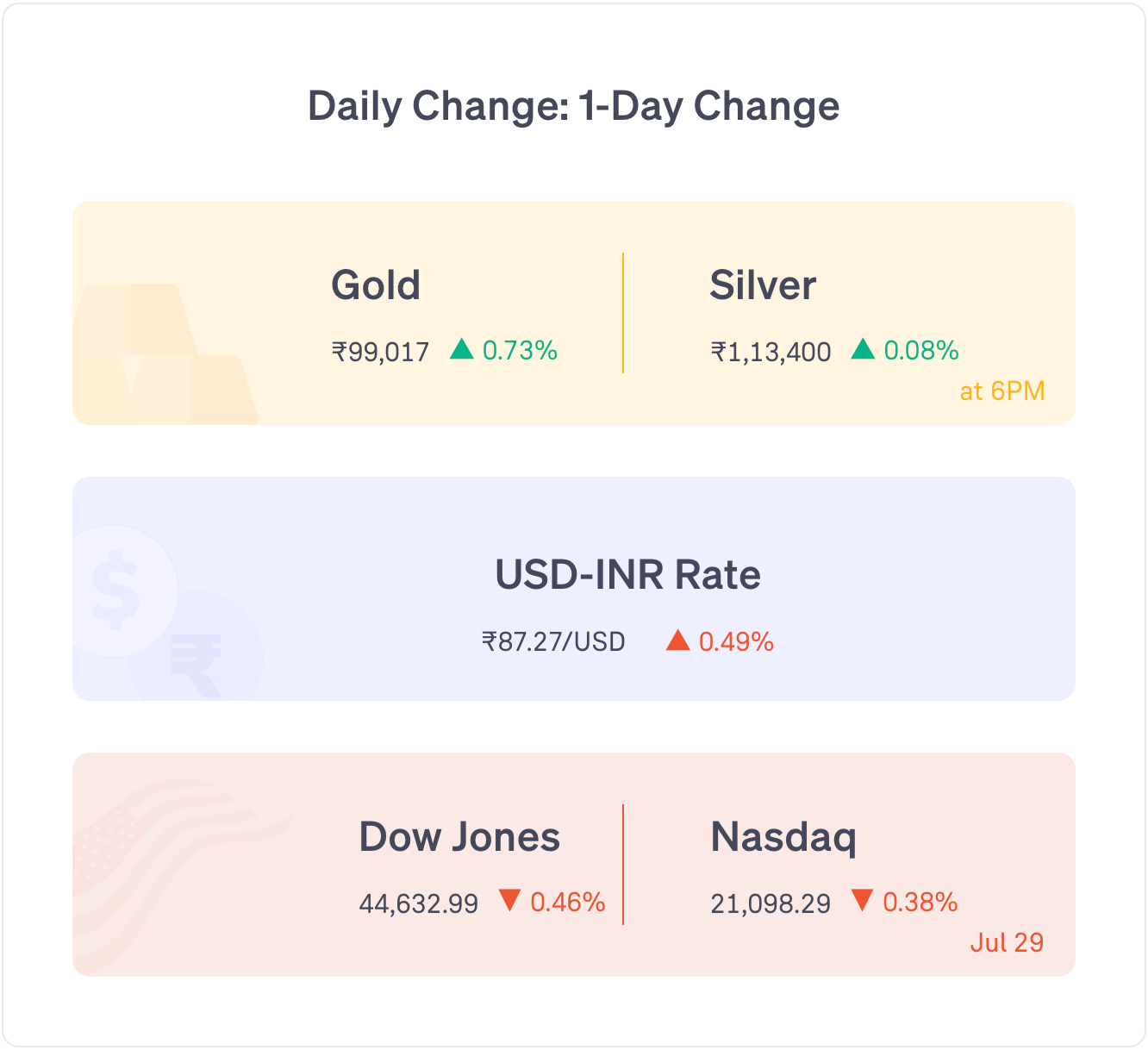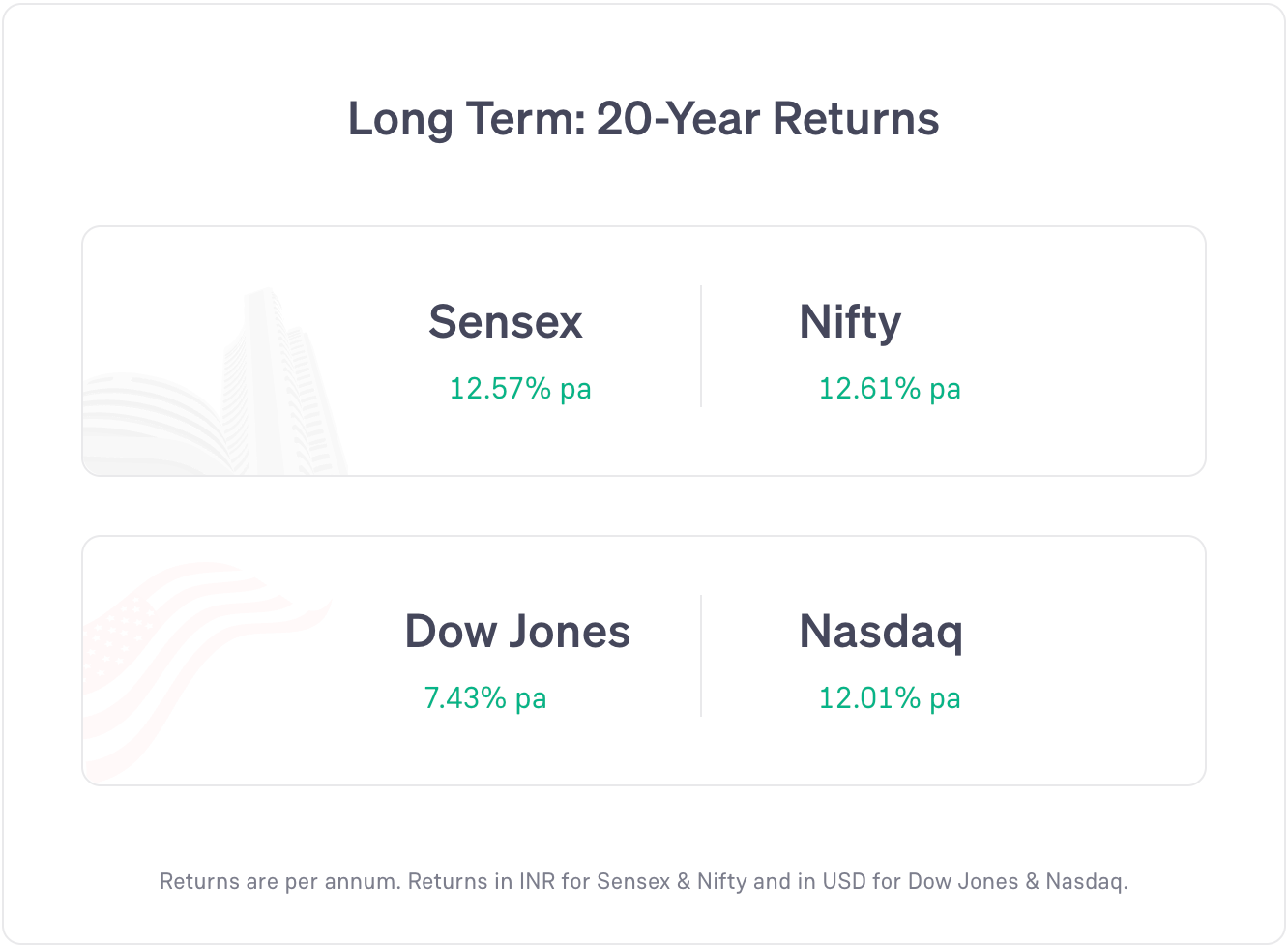ISRO-NASA launch NISAR, GNG Electronics 50% listing gain, & more — Daily Digest
Wednesday, 30 July 2025
Markets opened slightly above yesterday’s closing point.
Nifty 50 was volatile in the first half of the day. Main reason being uncertainty around the India-US trade deal.
IT stocks and FMCG stocks rose today. Realty stocks and media stocks fell the most.
Global markets: US markets fell and most European markets closed in green. Most Asian markets also closed in green.
News
The Euro Area’s GDP grew 1.4% year-on-year in the second quarter of 2025 (vs 1.5% in the first quarter).
India, in collaboration with the US, successfully launched NISAR (NASA-ISRO Synthetic Aperture Radar Satellite) from Sriharikota, Andhra Pradesh. The earth observation satellite was a $1.5 billion collaboration between ISRO and NASA.
The RBI has set new limits on the investment of banks or NBFCs in Alternate Investment Funds (AIFs). From Jan 2026, a single bank or NBFC can invest only up to 10% of an AIF’s total fund size, and all banks/NBFCs together can invest only up to 20%. This has been done to prevent evergreening of loans and avoid concentration risk.
Indiqube Spaces got listed on the stock exchanges at a loss of 8.86% from its issue price and closed 8.03% down at the end of the day.
GNG Electronics got listed on the stock exchanges at a premium of 49.79% over its issue price and closed 40.67% up at the end of the day.
Sri Lotus Developers & Realty IPO has been subscribed 3.60 times. Retail subscription: 2.84 times. IPO closes on 1 Aug.
M&B Engineering IPO has been subscribed 0.66 times. Retail subscription: 2.59 times. IPO closes on 1 Aug.
Aditya Infotech IPO has been subscribed 6.88 times. Retail subscription: 20.09 times. IPO closes tomorrow (31 July).
Stocks Updates
Power Grid: net profit fell 2.5% year-on-year to Rs 3,631 crore in the April-June quarter. The board approved an increase in the borrowing limit from Rs 16,000 crore to Rs 25,000 crore for FY 2025-26. It also approved raising Rs 30,000 crore for FY 2026-27.
InterGlobe (IndiGo): net profit fell 20% year-on-year to Rs 2,176 crore in the April-June quarter.
Jio Financial: board approved issuing convertible warrants worth Rs 15,825 crore to promoter group entities via preferential allotment.
Tata Steel: net profit rose 117% year-on-year to Rs 2,078 crore in the April-June quarter. The board approved acquiring a 6% stake for Rs 6 crore in TP Adarsh Ltd, a subsidiary of Tata Power Renewable.
Hyundai Motor: net profit fell 8% year-on-year to Rs 1,369 crore in the April-June quarter. The board announced 5 August as the record date for its Rs 21 per share final dividend for FY 2024-25.
Punjab National Bank: net profit fell 47% year-on-year to Rs 2,120 crore in the April-June quarter. Net NPAs fell to 0.38% (from 0.6% in the previous year).
Bajaj Finance: raised Rs 1,000 crore through non-convertible debentures via private placement at 7.07% interest, maturing on 21 Sept 2028.
Bharat Electronics: received orders worth Rs 551 crore to supply optronic systems for aircraft, integrated financial management information system software, automated access control system, etc.
Word of the Day
Public Provident Fund (PPF)
It is a long-term savings scheme backed by the government
It was introduced by the Ministry of Finance in 1968 to encourage small savings and long term financial planning.
The investment is low risk, giving stable, guaranteed returns. The interest you earn is tax free and the investment is eligible for deductions under section 80C of the Income Tax Act (under the old tax regime).
Anyone can open a PPF account at the post office or a bank.
You need to invest a minimum of Rs 500 annually (maximum of Rs 1.5 lakh).
Unlike an FD, a PPF has a lock-in period of 15 years, which can be extended later. So, it is less liquid.
The current interest rate for the scheme is 7.1% per annum.
6 Day Course
Theme: quant investing
Day 3: Wednesday
Letʼs try to understand black box models.
In quant investing, often machine learning and artificial intelligence are used.
In this technique, often the team gathers historical data of various kinds (price, trading volume, repo rate, revenue, countryʼs GDP, sentiments, inflation, etc).
All of this is fed into a machine learning model along with the desired action.
Then, the model slowly learns to match different conditions with different actions. This is often supervised by the model making team.
So after the model has been given data and the engineers keep telling it which response is desired and which is undesired, the model starts to get more accurate with its output.
With enough data and training, the model reaches an accuracy level that can be used in investing.
The model is then backtested on old data. If it works satisfactorily, the model is used.
It is called ʼblack boxʼ because the makers do not know how it works internally. They have only trained it by giving it data and telling it what to do and what not to do.
Featured Question
Q. “In quant investing, if we create a ML model which does trading on our behalf, then is it completely legal as per SEBI rules? Are there some guidelines for it? Also I believe the gains would still be taxed as usual, right?”
Yes, it is legal.
If you develop a quant model, you will have to use API services to place the trades.
This comes under algo-trading.
SEBI has rules for algo-trading. As long as you follow those rules, it is fully legal.
Some platforms in India offer algo-trading APIs. When you sign up on them, you will be asked to read and accept the terms and conditions.
Read these carefully before investing using APIs.
Some new rules are being introduced by SEBI for algo-traders. Most of these concern the stock brokers and not the traders or investors.
There are some limits on the number of orders you can place in a minute. More rules are also coming in but nothing major as such.
This is in case of 'white box models' (where the decision making algorithm is clearly explanable).
In case of 'black box models' (where the decision making algorithm cannot be explained clearly), the rules are a lot more strict.
Taxation depends entirely on the type of order placed and the duration of investment — it does not matter if the order was placed via algos or the stock broker platform.
There are many investors in India who use algo-trading APIs regularly.
Did you like this edition?
Leave a feedback here!






